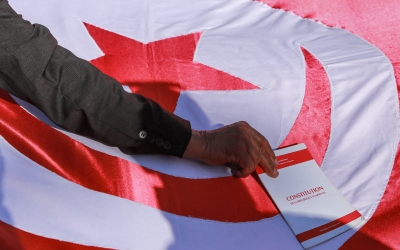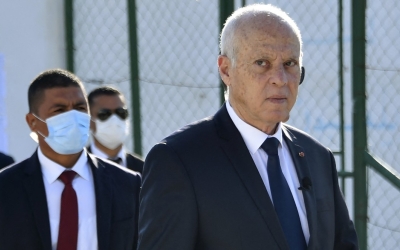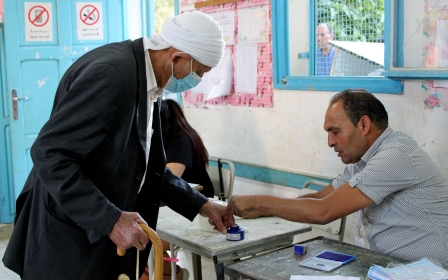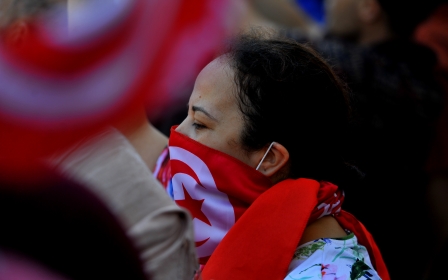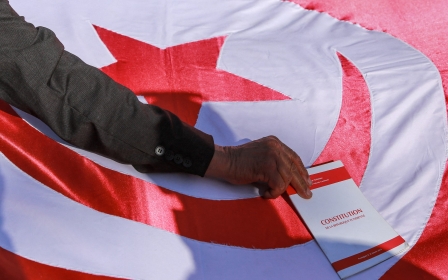Tunisia enters new era as President Saied declares victory in constitutional referendum
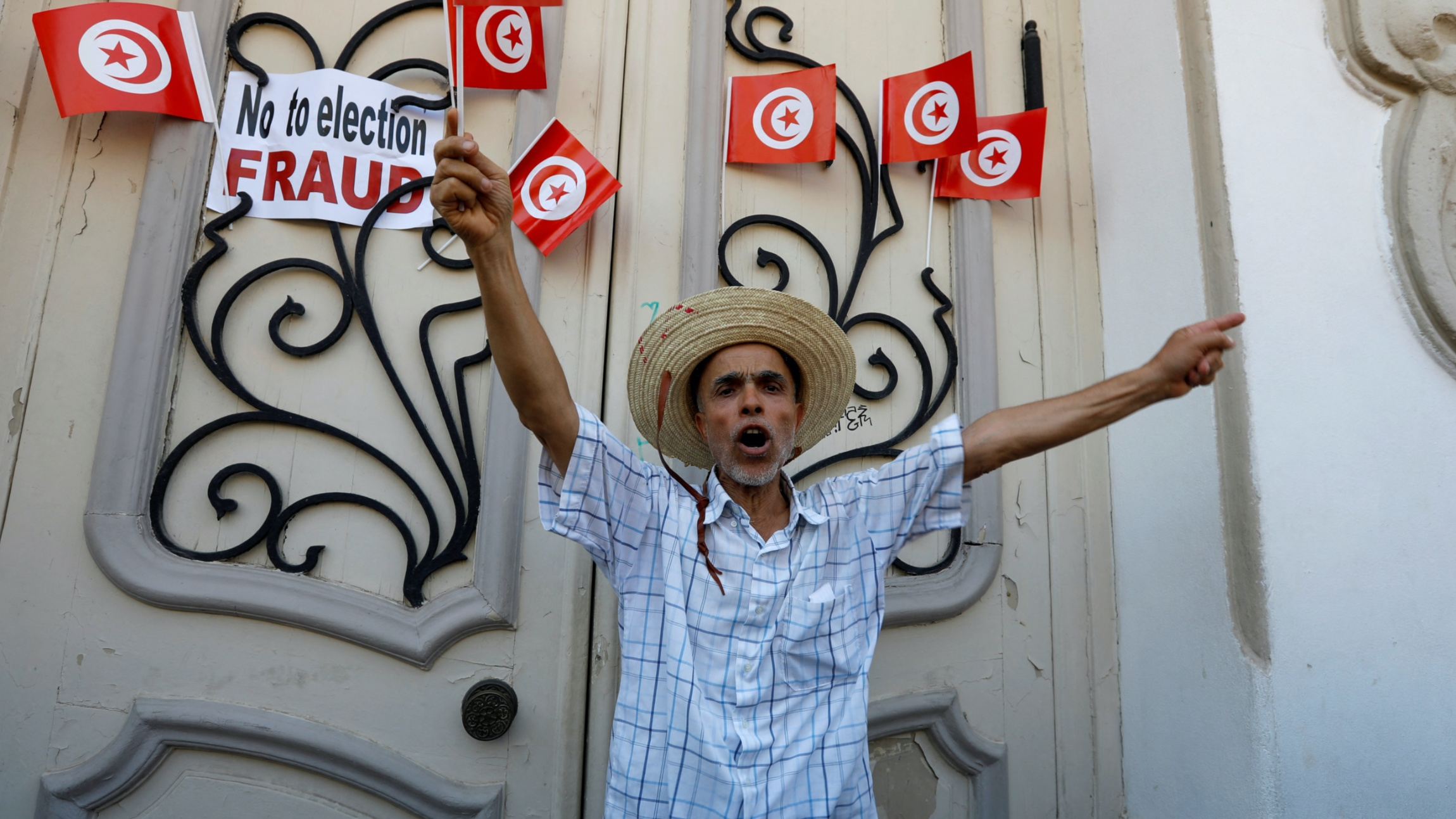
Tunisian President Kais Saied's constitutional victory was a foregone conclusion. The "yes" vote on a turnout of 27 percent is not reflective of the views of the majority of Tunisians, according to the International Commission of Jurists.
"The referendum failed to mobilise more than a quarter of the electorate. The resulting constitution does not reflect the views of the majority of Tunisians and as such lacks democratic legitimacy," said Said Benarbia, the Middle East-North Africa regional director at the Geneva-based organisation, told Middle East Eye.
'I fear Saied's regime may adopt more draconian measures as in Egypt and start spying on dissidents'
- Tunisian academic
Ever since Saied ousted parliament last year and moved to rule by decree, he has sought to incrementally consolidate power, rolling back hard-fought democratic achievements using growing public discontent towards the economic situation to make his power grab.
Saied rewrote the democratic constitution introduced after Tunisia's 2011 revolution that toppled autocrat Zine al-Abidine Ben Ali, and for Benarbia, the new constitution "defeats the very idea of separation of powers and checks and balances, and removes all the guarantees and protections against Ben Ali-type human rights violations."
In the end, the "yes" vote garnered 92.3 percent, with opposition parties boycotting the referendum, which has been widely condemned as auguring a slide back to one-man rule in the country.
The chilling effect of the consolidation of the new regime has also left Tunisians abroad fearing for their safety.
A Tunisian academic living in Canada described feeling sick because "of the horrible events in Tunisia".
"I am trying to limit my media appearances as I fear Saied's regime may adopt more draconian measures as in Egypt and start spying on dissidents," she told MEE on condition of anonymity, adding that "my research work on Tunisian transition is very sensitive".
Saied's brief moment of triumph will soon need to contend with the lived reality of ordinary Tunisians.
Mandate for a political project
The editor-in-chief of Meshkal, a Tunisian-based media outlet, Fadil Aliriza, said the president's "focus on a new constitution instead of economic challenges has already drained Saied's political capital."
As the political crisis unfolded this past year, ordinary Tunisians have had to contend with an increasingly worsening economic crisis, and the country is seeking a bailout from the International Monetary Fund.
Saied's focus, on the other hand, has been to shore up his legitimacy in a disillusioned and increasingly polarised society.
"Given apparently low turnout, the legitimacy of the constitution will correspond to the vote: those who boycotted will not see it as legitimate, those who voted 'yes' will see it as legitimate," said Aliriza.
"Nevertheless, he is likely to treat the outcome as a mandate to continue building his political project."
Saied's constitution referendum, unlike best global governance standards, deliberately refrained from creating a minimum threshold for the vote turnout.
What this meant according to Monica Marks, Middle East politics professor at the New York University Abu Dhabi, is that "theoretically, if only one Tunisian voted but they voted yes, this constitution would have still passed.
"It's actually absurd to hold a binding referendum, especially a constitution, without instituting a minimum threshold. It's such a crucial document that will pattern the entire legal framework for the entire nation for years to come."
Crowning moment
When Saied initially made his move against the Tunisian parliament, suspending it on 25 July 2021, the step seemed to be popular, with thousands of Tunisians voicing their support in the streets.
After years of widely perceived misgovernance and a political class that appeared to many as busy with jockeying for personal power, Saied's promise to cut through it all and deliver economic and political stability seemed appealing.
That enthusiasm has waned, however, as Saied's focus has strayed.
"Amongst a small sliver of Tunisians, there has been excitement" that this new constitution will bring about a positive change, Marks said from Tunis.
The majority of Tunisians, however, are "disengaged, unconcerned, they never asked for a new constitution in the first place, and they are preoccupied overwhelmingly with the dire state of the Tunisian economy".
Marks described a widespread "lethargic mood" in the country. Words like "exhausted" and "disengaged" best describe the atmosphere that has surrounded this referendum.
"One thing is clear after this result: Kais Said has consolidated his dictatorship," she said. "This is Kais Saied's crowning moment in his dictatorial consolidation."
While the referendum generated little attention in the region, which is still reeling from the Arab Spring challenge to the autocratic grip on the region, Tunisia was, until recently, the last remaining flicker that people could shape their own future.
While the referendum generated little attention in the region, Tunisia was, until recently, the last remaining glimmer around the Arab world that people could shape their own future.
"Democracy in Tunisia has been dying an agonising death for the past year," said Marks, as Saied now seeks to transform the country from a parliamentary democracy to a presidential model that concentrates power in his hands.
"In so far as Saied's illegitimate constitutional referendum can be called legal, he has a text. He has a shrubbery of legal figleaf to rule by personal fiat, which puts us in a far darker stage of Tunisia's descent into dictatorship.
"No longer is that pesky 2014 constitution hanging over his head," said Marks, "it's up to the Tunisian people now."
Middle East Eye propose une couverture et une analyse indépendantes et incomparables du Moyen-Orient, de l’Afrique du Nord et d’autres régions du monde. Pour en savoir plus sur la reprise de ce contenu et les frais qui s’appliquent, veuillez remplir ce formulaire [en anglais]. Pour en savoir plus sur MEE, cliquez ici [en anglais].


